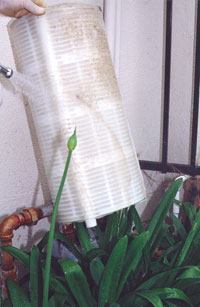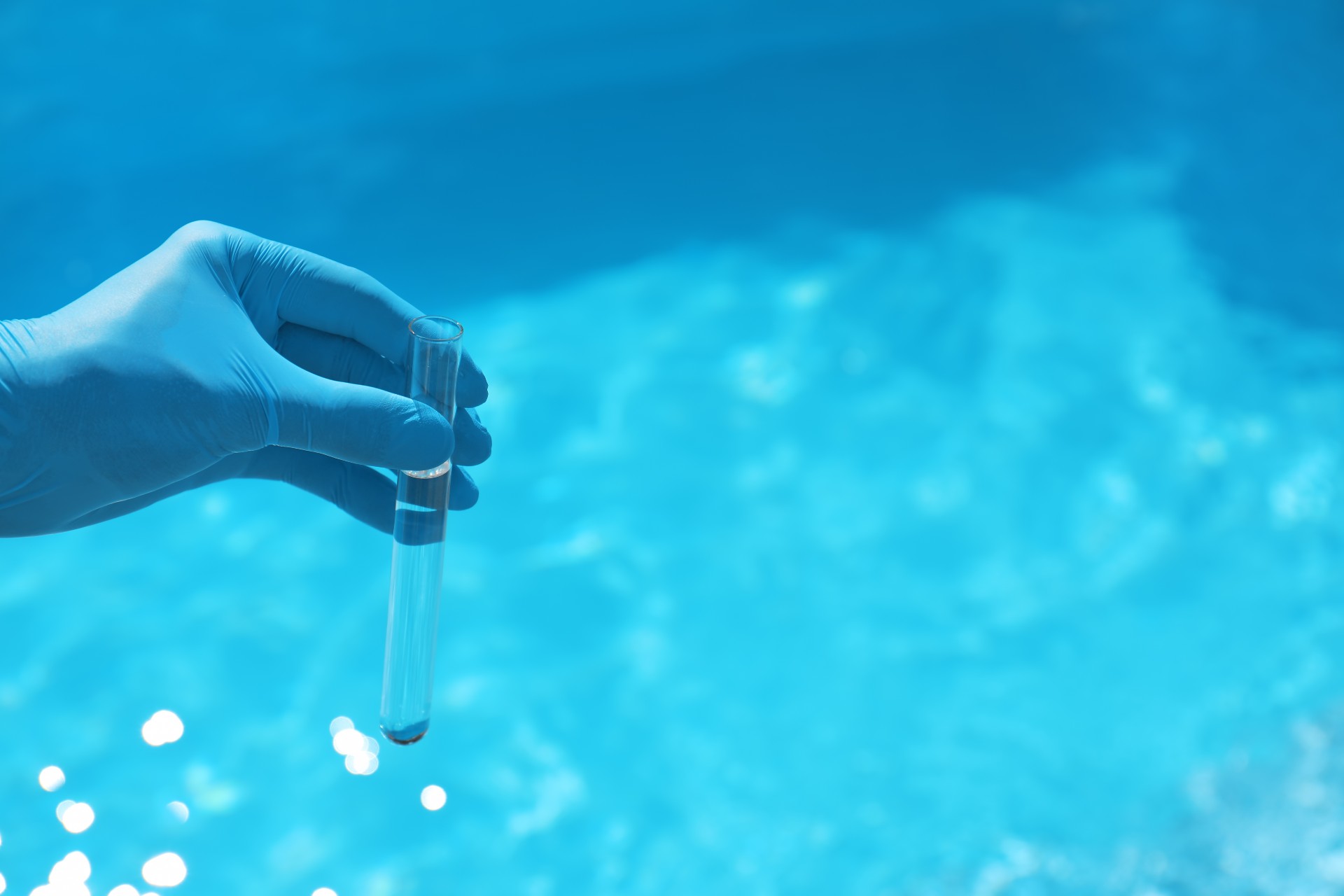The Cellulose Option
Not everyone uses diatomaceous earth in their DE filters. Some pool owners use a cellulose-based substitute.
Pool service technicians who want to use cellulose fiber in a DE filter should remember to never mix cellulose with traditional DE or the filter will quickly become clogged. It’s also important to clean the filter grids carefully before switching from DE to cellulose.
In addition, follow the cellulose manufacturer’s directions on how much of the medium to add to the pool. The amount is significantly less than the amount of regular DE required to coat a filter.
Cellulose manufacturers say a filter might have to be backwashed a few more times after first switching from regular DE, but the intervals between backwashing should increase with use.
The cellulose substitute can also be utilized as a supplement to a sand filter (sprinkled across the top of the sand) or to lightly coat a cartridge filter, particularly in a spa, to aid in oil removal.
“We use it in cartridge filters and it’s fantastic,” says Javier Payan, owner of Payan Pool Service in San Diego.
Diatomaceous earth and cartridges each do an excellent job of keeping pools free of particulates. However, there are cases where it makes sense to choose one filter medium over the other. Here’s a look at where each shines.
Diatomaceous earth
Jim Romanowski is a DE guy. “I really love DE filters because they just filter so much better,” he says. But several years ago, one of the commercial pools he services was undergoing a remodel and the contractor specified three high-rate sand filters in the plans. “I questioned this, but decided the best way to know their efficiency was to give them a shot in the field.”
The customer found he was using more electricity and chemicals than he had previously. Then an automatic chlorinator failed and the resulting green pool took a long time to clear. Shortly thereafter, Romanowski, who owns Pool Perfection Pool Service in Huntington Beach, Calif., pulled out the sand filters and replaced them with new DE filters.
DE filters are among the most effective ways of clearing solids from pool water, removing particles as small as 4 microns in diameter. Sand filters, on the other hand, will remove particles as small as 25 microns and cartridge filters will remove particles as small as 15 microns. To put it in perspective, a grain of table salt is about 100 microns in diameter.
That fine filtering appeals to Scott Overholt, owner of Complete Pool Care in Hemet, Calif. “I’ve had a number of customers who I convinced to use DE filters,” he says.
“The DE filters work much better on catching the algae. You just backwash or clean it after that, especially in a pool that’s been neglected for a while,” Overholt says.
Quick recovery
Romanowski also appreciates the bounce-back ability of a pool with a DE filter. “With a DE filter, you can shock it, backwash it, clean the filters and overnight you can get a good-sized pool clean again. Sooner or later, something’s going to go wrong and a pool with DE filters that has something wrong will recover much faster,” he says.
DE is made of fossilized skeletons of prehistoric plankton that act like tiny sponges. It’s introduced into the pool by way of the skimmer, sometimes in a slurry. A good rule of thumb is to add 1 pound of DE per 10- to 12 square feet of filter area. The media runs through the system and adheres to a grid, or septum, in the filter. There, the DE traps particulates.
Although DE is perhaps the most efficient filtering media, it has drawbacks. The first has to do with safety. Service technicians must guard against inhaling DE while they’re adding it to a pool. Each tiny skeleton has sharp edges, which can cause problems in the lungs. Techs are advised to use a dust mask when pouring DE into the skimmer.
The filters must be backwashed and recharged periodically with fresh DE, usually when it’s 8- to 10 pounds of pressure over the reading taken right after the filter’s cleaned. “Every system’s different. You get to know each swimming pool’s eccentricities,” says Bob Foutz, owner of Purity Pool Service also in Huntington Beach. “I had a condo pool that if it was at 19 pounds [of pressure at the filter], I knew it would make it through the weekend. If it was at 20 or 21 pounds, I knew I had to backwash on Thursday; the pool wouldn’t make it through to Monday.”
Backwashing issues
In addition, a full cleaning should be performed at least once a year, with some techs recommending services be done at the beginning and end of a swimming season. And when the filter grids are cleaned, care must be taken to ensure that the old DE isn’t washed into a storm drain. “I’ve had some really old pools that had DE filters but no backwash line, so the water just ran out into the street, and that’s illegal,” Foutz says. “So when their filters gave out, I talked them into switching to cartridge because their backyard is better suited to that.
“In a cleanout, I backwash first to get as much out of the filter as possible. If it has a backwash line, you can sometimes clean the grids right in the tank, so all the dirt goes right into the sewer system. If you can’t do that, I scrape as much of the muck into a bucket as I can, then I’ll clean it in the bushes or the grass.”
The used DE won’t hurt grass or plants, but service techs should check with the customer before washing DE into greenery. It also can be thrown in the trash.
Another issue with DE filters is that the filter grids themselves can become torn or clogged and require replacement. “Commercial accounts go through a lot of grids,” Overholt says. “The cloth seems to decay faster with more chemicals going through the system.” If DE starts showing up in the pool, it might mean that one of the filter grids is torn.
Complexity is another characteristic of DE filters. This can work to a service tech’s advantage. “They have the most moving parts of any filter, so they break down more often. There’s more money to be made,” Foutz says.
Cartridges
Cartridges don’t filter quite as small particles as DE, but they have the advantage of being simpler to use. There is no backwashing with a cartridge filter. Instead, the element is removed from the filter, hosed off, cleaned and replaced in the filter. If there is a heavy mineral buildup, the element can be soaked in a solution of filter-cleaning product. Cartridge filters also have the advantage of having the smallest footprint of any of the three filtering methods. This can be crucial when only a small amount of space is available for the equipment pad.
“There is a shift moving toward cartridge,” says Javier Payan, who owns Payan Pool Service in San Diego. “We do a lot of work in coastal communities with small properties and there’s really no place to clean a DE filter. Some customers want us to take the filter off-site to clean it.”
So for many of those customers, Payan recommends a switch to cartridge filters. Most of those clients have accepted the switch. “We tell customers they will not notice the difference,” Payan says.
Ease of use
Jerry Wallace, president of Swim Chem in Sacramento, Calif., has been sold on the advantage of cartridge filters for some time. “It’s a nice sell; they’re clean, they’re easy to use,” he says. “The filtering efficiency has improved dramatically since they were first introduced. The capacity is pretty good — you can have pretty long run cycles with them.”
Other than an occasional cleaning, the only maintenance is the replacement of the filter element. And modern elements can last a long time if they’re well cared for.
“It depends on how well they’re taken care of,” Wallace says. “If they’re not properly sized, if the flow rates are really high, if the pressure increases because they’re not cleaned often enough — all that has an effect on the life expectancy of the cartridges. We usually get three- to five years on a cartridge, and sometimes they go longer than that.”
Stricter dumping regulations are causing some pool service techs to switch to cartridges. “When they imposed new discharge regulations and started fining pool guys, it became more of an issue,” says Bill Peck, owner of William Peck Pool Service in San Diego. “Cartridge filters, if sized properly, are usually a better option than trying to find a place for backwash water.”
Wallace sees some customers switching from DE to cartridge. “We’re still doing a few conversions,” he says. “A lot of our customers have had their diatomaceous earth filters replaced already by us or by somebody else. There are still some DE filters out that that we’re changing to a cartridge filter.”
Pool owners who switch from DE to cartridges usually don’t see a difference in their water quality. “I wouldn’t be afraid of the change,” Wallace says. “My dad started the business way back when and we started with DE. When cartridges first came out, we didn’t push them that much. But over the years, as the technology improved, the filtering capabilities of the product improved, and now with the high-capacity filters, we’re definitely believers.”
Wallace pointed out that cartridges can even bring a bonus to a pool owner. “The thing that makes it real easy for the consumer is if they’re do-it-yourselfers; you can have a second set of cartridges and they can clean them at their leisure,” he says.




